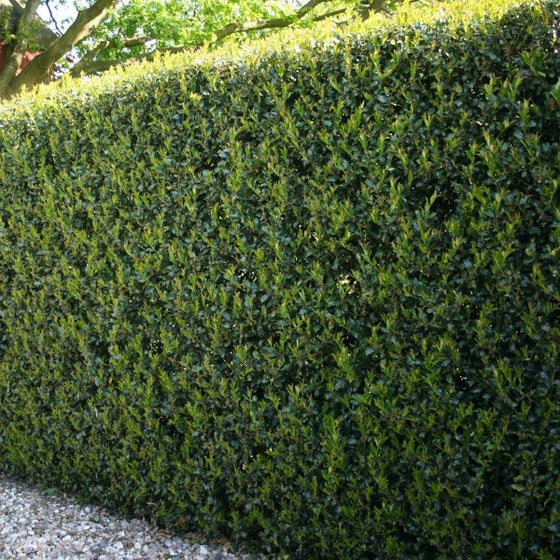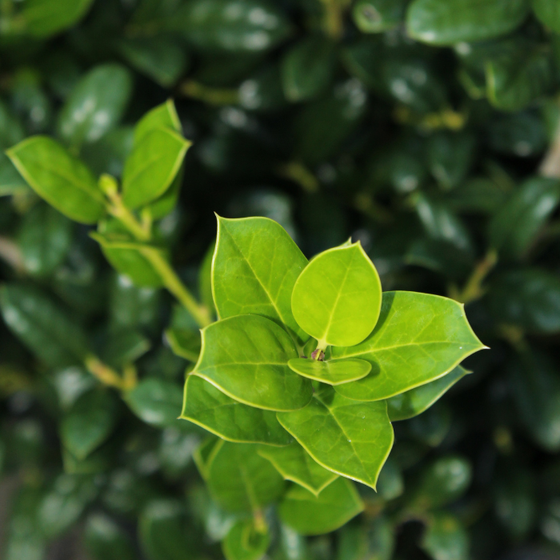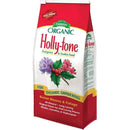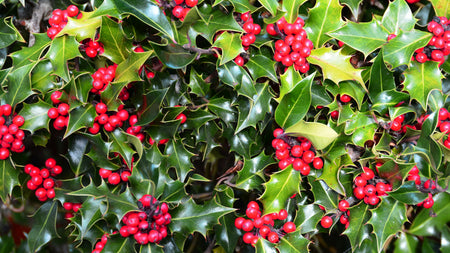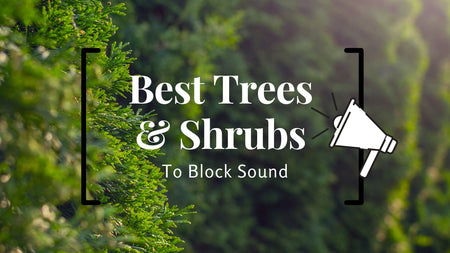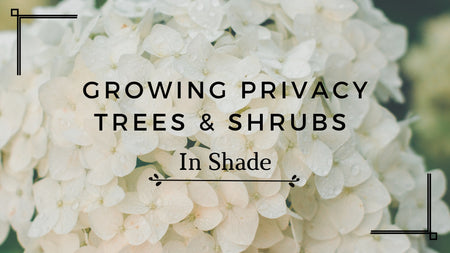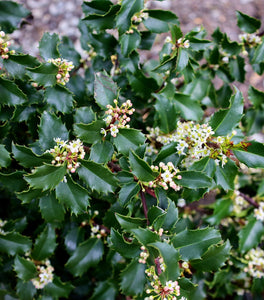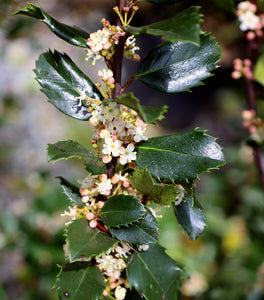
Images Depict Mature Plants
Dwarf Burford Holly Shrubs for Sale Online
Dwarf Burford Holly (Ilex cornuta 'Burfordii Nana') is a compact, evergreen shrub prized for its glossy, deep green leaves and bright red berries that persist throughout winter. This versatile holly variety features characteristic spiny leaves that have a rich texture, adding visual interest and structure to any landscape. Unlike larger holly species, Dwarf Burford Holly has a naturally dense, rounded growth habit, reaching a mature height of 5 to 6 feet with a spread of 4 to 6 feet, making it ideal for use in foundation plantings, low hedges, or as an accent shrub. Its bright red berries attract birds, providing a valuable food source during the colder months and enhancing the ecological value of your garden.
Dwarf Burford Holly thrives in full sun to partial shade and prefers well-drained, slightly acidic soil, though it can adapt to various soil types, including clay. This rugged, low-maintenance holly is drought-tolerant once established, making it well-suited for regions with inconsistent rainfall. Additionally, Dwarf Burford Holly is heat tolerant, which makes it a great option for warmer climates, and its deer-resistant foliage deters browsing, making it a reliable choice for gardeners looking to protect their landscape from deer damage. The shrub's compact size and adaptability make it perfect for mixed borders, privacy hedges, and even container plantings, where it provides year-round color and interest.
Another great feature of Dwarf Burford Holly is its ability to produce berries without needing a separate male pollinator, as it is considered a self-fertile variety. This makes it a convenient choice for homeowners who want the attractive red berries without needing to plant multiple hollies for pollination. The vibrant berries combined with the shrub's dense, evergreen foliage provide four-season interest, bringing color and texture to the garden throughout the year. With its compact form, resilience to various growing conditions, and ability to produce bright berries, Dwarf Burford Holly is a versatile and valuable addition to any landscape.
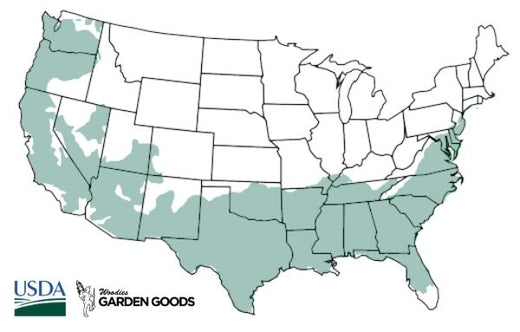
| Hardiness Zone: | 7-9 |
|---|---|
| Mature Height: | 6 to 8 Feet |
| Mature Width: | 8 to 10 Feet |
| Sunlight: | Full sun to part shade |
| Foliage Color: | Dark green |
| Growth Form: | Upright pyramidal |
| Soil Conditions: | Very tolerant of most soil conditions |
How to Care for Dwarf Burford Holly
Before you buy a Dwarf Burford Holly, make sure to read about the recommended care instructions to keep your Holly healthy and thriving.
How Do I Plant a Dwarf Burford Holly?
To plant a Dwarf Burford Holly, start by selecting a location that offers full sun to partial shade with well-drained, slightly acidic soil. This hardy shrub is adaptable to a variety of soil types, including clay, but it thrives best in moist, fertile conditions. Begin by digging a hole that is twice as wide and as deep as the root ball to allow ample space for root growth. Place the Dwarf Burford Holly in the hole, ensuring the top of the root ball is level with the surrounding soil surface. Backfill with the original soil, gently firming it around the roots to eliminate any air pockets, and then water thoroughly to help the plant settle in. Proper watering is crucial during the initial planting stage to ensure the roots establish well. After planting your Dwarf Burford Holly, apply a 2-3 inch layer of organic mulch around the base of the shrub to help retain moisture, moderate soil temperature, and prevent weed growth. Be careful to keep the mulch a few inches away from the trunk to avoid moisture buildup, which could lead to rot. Space the Dwarf Burford Hollies about 4 to 6 feet apart if you are creating a hedge or foundation planting, allowing enough room for their mature size while still achieving a dense, attractive look. Water the shrub regularly during the first growing season, especially during dry periods, to help it establish a strong root system. With proper planting and care, Dwarf Burford Holly will thrive, offering year-round lush foliage and vibrant red berries, perfect for enhancing your landscape with color and structure.
How Do I Water a Dwarf Burford Holly?
To water a Dwarf Burford Holly, it's essential to keep the soil consistently moist, especially during the first year after planting, as this is when the shrub establishes its root system. Water deeply once or twice a week, depending on weather conditions, ensuring that the moisture reaches the roots. During hot or dry periods, increase the frequency to prevent the soil from drying out completely. The best way to water Dwarf Burford Holly is by using a soaker hose or drip irrigation, as this allows water to penetrate deeply into the soil, promoting healthy root growth and reducing the risk of fungal issues. Always water at the base of the plant rather than overhead to minimize wetting the leaves, which can lead to disease. Once your Dwarf Burford Holly is established, it becomes more drought-tolerant but will still benefit from regular watering during extended dry spells, particularly in the summer months. Check the soil moisture level by inserting your finger about 2-3 inches into the soil—if it feels dry, it’s time to water. To help retain moisture and maintain a consistent environment for your holly, apply a 2-3 inch layer of organic mulch around the base, making sure to keep it a few inches away from the trunk to avoid rot. This mulch will not only reduce evaporation but also keep the roots cool during hot weather, contributing to the overall health and vigor of the shrub. With proper watering, your Dwarf Burford Holly will grow into a lush, vibrant shrub, showcasing glossy foliage and bright red berries year-round.
How Do I Fertilize a Dwarf Burford Holly?
To fertilize a Dwarf Burford Holly, start in early spring, just before new growth begins, by using a balanced, slow-release fertilizer, such as a 10-10-10 formula. This will provide the shrub with the essential nutrients it needs for healthy foliage and berry production. Spread the fertilizer evenly around the base of the plant, extending it to the drip line, which is the area directly below the outer branches where the roots actively absorb nutrients. Avoid placing the fertilizer directly against the trunk to prevent root burn. Once you apply the fertilizer, water thoroughly to help the nutrients penetrate the soil and reach the roots, encouraging robust growth. It is also beneficial to test the soil pH before fertilizing, as Dwarf Burford Holly thrives in slightly acidic soil, ideally between 5.0 and 6.5. If your soil is too alkaline, consider adding Espoma Soil Acidifier to lower the pH gradually, providing the optimal environment for nutrient uptake. In addition to chemical fertilizers, supplementing with organic matter like compost or aged manure is a great way to enhance soil quality and offer a consistent source of nutrients. Avoid over-fertilizing, as this can lead to excessive leafy growth and may reduce berry production. Proper fertilization ensures your Dwarf Burford Holly remains healthy, dense, and vibrant, with glossy green leaves and plenty of bright red berries throughout the year.

How Do I Prune a Dwarf Burford Holly?
To prune a Dwarf Burford Holly, it is best to do so in late winter or early spring before new growth begins. This timing allows you to shape the shrub without disrupting the blooming process, which is essential for berry production. Start by removing any dead, damaged, or diseased branches to maintain the plant's health and prevent pests or diseases from spreading. Next, thin out the interior branches to improve airflow and sunlight penetration, which helps reduce the risk of fungal issues. Use sharp, clean pruning shears to make precise cuts, ensuring a tidy, well-shaped appearance that encourages dense foliage growth. If you're maintaining Dwarf Burford Holly as a hedge or a formal shape, you can lightly trim it throughout the growing season to maintain its compact, rounded form. Avoid heavy pruning after mid-summer, as this can remove the buds that will produce berries in the fall. Always be mindful of the natural growth habit of the shrub, aiming to enhance its form rather than over-prune it, which can stress the plant. With proper pruning techniques, your Dwarf Burford Holly will remain a dense, attractive evergreen, featuring lush foliage and vibrant red berries that bring year-round interest to your landscape.

